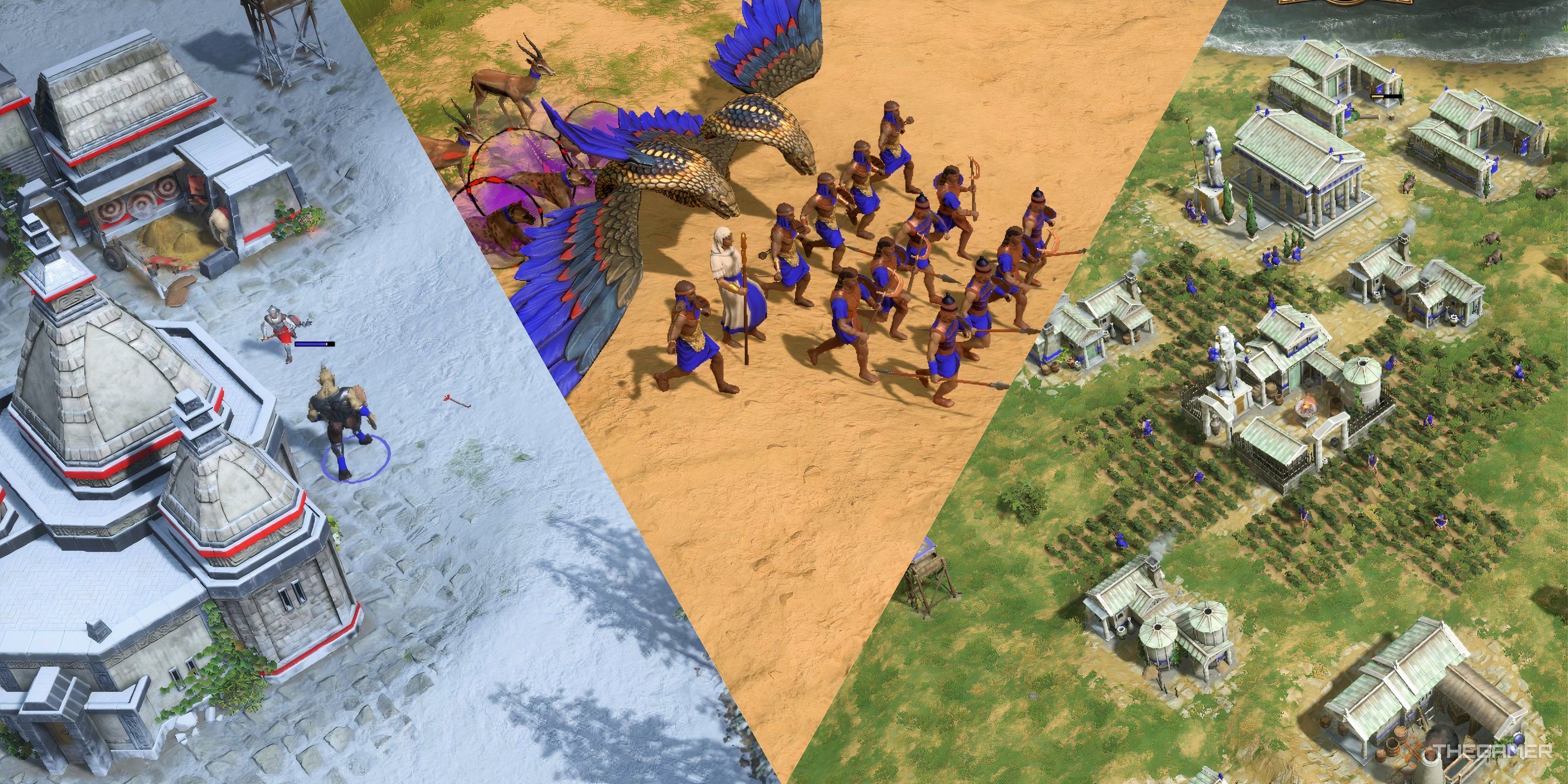
Advancing through the ages, recruiting an army of realistic and unreal soldiers from myth and legend, and conquering foes rules by other gods is the name of the game in Age of Mythology: Retold. This massive strategy game allows for an equally massive array of different strategies to employ, and they're all viable and balanced.
RelatedThe Best Games With Lore Based In Greek Mythology
If you're a fan of the Greek Pantheon and other tales from antiquity, these games are for you.
PostsDespite having a pretty robust campaign that teaches you the ins and outs of the gameplay mechanics on offer, Age of Mythology still offers quite the steep learning curve that will test your skills and patience. Getting to grips not only with the economic and military demands but also the various playstyles of the gods on offer is paramount to success.
Test Every God To Find Your Playstyle
Age of Mythology has 12 gods to play as by default upon launch (13, if you have Freyr purchased) that belong to one of four different pantheons, and each of these gods has very different general playstyles that greatly affect how they are best played.
God
Focus
Greek Pantheon
The Greek pantheon has powerful scouting and military units, but tends to require a strong economy no matter what your strategy as their units are expensive. They have very powerful heroes, but they are limited, and Favor required Villagers to worship at a Temple rather than gather other resources.
Zeus
Zeus's focus is on infantry and hero units and also has fantastic buffs to Favor generation.
Hades
Hades's focus is ranged units, and this also applies to buildings that can attack. He also spawns allied Shades from fallen enemies.
Poseidon
Poseidon has powerful cavalry, which is already a particular strength of the Greeks. He also has buffs to naval and economic growth.
Egyptian Pantheon
Egyptians have vastly cheaper building costs, but the mud bricks they use take far longer to construct. They are buffed by having a Pharaoh, who can empower buildings to improve construction speed, gatherer efficiency, and even offence. Egyptians earn Favor by constructing Monuments, which are also affected greatly by your choice of major god.
Ra
Ra's bonuses are largely focused on late-game units from the Migdol Stronghold building, which are powerful but expensive.
Isis
Isis is an adaptable god whose focus is on technology and large populations.
Set
Set's focus is on the Barracks and the units you can recruit there, which all happen to be counter units. He also allows you to field offensive animals in your army.
Norse Pantheon
The Norse are quite offensively minded, with their military units being responsible for building construction and Favor earned directly from battle. They tend to be heavy on hero units, which can be a boon or a flaw, depending on their opponents.
Thor
Thor's focus is on the Dwarf unit and the Armory, which both focuses synergising nicely.
Odin
Odin's focus is on units recruited from the Great Hall, making him great for fielding armies made up mostly of cavalry and heroes.
Loki
Loki's focus is on myth units, and depending on the minor gods you choose, you can get some excellent ones.
Freyr
Freyr's focus is on technology and defence, which feeds well into a passive, defensive strategy that makes great use of his exclusive minor gods.
Atlantean Pantheon
Atlanteans have a few unique quirks that make them stand out. For one, their regular humans can be turned into heroes (which is great for getting the most out of their high unit costs), they gain Favor through their Oracle units, and their gatherer units don't need to drop resources off at a drop site (though they compensate for this by being relatively slow).
Kronos
Kronos's focus is on siege units and myth units, which work together well to make a bulky (if expensive) army.
Oranos
Oranos's domain is vision and mobility, which allows you to gain quicker and more complete control over the map. This strategy is very powerful, but requires some skill.
Gaia
Gaia is another versatile god who focuses on economy and building buffs. Notably, she gets buffs that allow her buildings to heal nearby units, which is fantastic for raiders and hit-and-run tactics.
Testing out each of these gods for a few games each is a great way to see if their preferred playstyles gel with your preferences.
Rush For The Classical Age
A very important concept to grasp at the beginning of every game is the rush to the Classical Age. The Archaic Age, where games begin, has very little versatility - the only variance in strategy is how you intend to gather resources and age up as quickly as possible.
Practicing your opening moves for each starting situation is a great way to get an edge. You'll want to know off the top of your head how many gatherers you need to assign to Food and Gold gathering, when to build a Temple and more Houses (if needed), and when to pivot some gatherers to Wood.
It can take a while to get to grips with this, but it's absolutely worth the effort.
Try Out The Villager Priority System
Retold comes with a brand new mechanic to the Age of Empires series - automated villagers. When enabled, this will assign and reassign your villagers (or laborers, or gatherers, or what have you) as your resources fill up, depending on which preset or custom resource goals you have set.
Villager Priority must be enabled in the game setup menu before it can be used.
This can be a great way to avoid the micromanagement that often comes with this series, though we will stress that the system will never be as efficient as a skilled human.
If you do decide to use this system, there are a few things to look out for:
- As the Greeks, the system will never assign villagers to pray at the Temple. You'll have to do this manually. Don't worry about them getting reassigned.
- Villagers will often travel long distances to drop off resources - it's a good idea to check in on them every now and then and build closer drop zones if they're straying too far.
- Similarly, Villagers can sometimes get caught too far from a drop site and not get reassigned. Keep an eye on the top of the screen to catch any villagers who need manual correction.
Always Focus On Your Economy
A strong economy is crucial to Age of Mythology, and this is always true, no matter the age you're in or whether you're actively warring or not.
There are two easy ways to help optimise and maximise your economic growth:
- Always be producing villagers. The more you have, the better your resources will be gathered. If you make a second Town Centre (and you should in longer or harder matches), turn on auto-recruitment there to keep the flow of villagers incoming. Increase your population cap whenever needed.
- Grab new economic technologies as soon as they become available. They are far more useful when grabbed early, as opposed to military technology, which only come 'online' when you actually use the relevant units in a battle. As soon as you age up, check your economic buildings and get the economic technologies you need.
As a specific pantheon tip, it's a good idea to prioritise Gold when playing the Egyptians. They require a hefty amount of it no matter what your army strategy is, especially with the most powerful units.
Learn How Counter Units Work
When hovering your cursor over a unit button when deciding what to recruit, you'll get a brief tooltip explaining which units that unit is more effective against.
A particularly tricky type of unit is the counter unit. These are specialised and lethal against one particular type of enemy but rather lacklustre against any other type of unit. It's a good idea to scout out your enemy's army composition and seeing if they favour a particular type of unit (for example, a Hades player who uses lots of ranged units) and then forming an army of the relevant counter units.
It's worth noting that some technologies can turn counter units into more general units - these will go a long way to making these units more applicable to more situations, allowing them to be spammed no matter what your enemy is using.
Build Multiple Military Building Copies
Building more than one copy of a military building is a fantastic way to ensure your army is kept supplied at all times. If you only have one building, you see, you can only produce one unit at a time.
Doubling or tripling the rate of recruitment (or going even further in the Mythic Age, which is recommended) will make sure you're never waiting long before you can mount a brutal attack, a counterattack, or a desperate defence.
NextBest Strategy Games You Can Play Offline
You won't need an internet connection to enjoy these strategy games.
Posts












